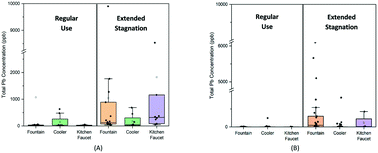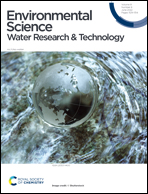Studying the impacts of non-routine extended schools' closure on heavy metal release into tap water†
Abstract
The extensive school closures due to the unprecedented COVID-19 pandemic resulted in prolonged water stagnation within schools' plumbing for longer durations than routine schools' holidays and summer breaks. With many of the U.S. schools suffering from problems of lead (Pb) in potable water for decades, the extended water stagnation caused by schools' closure has raised significant concerns regarding the schools' water safety. Thus, this research was conducted to evaluate the resiliency of schools' potable water plumbing toward the interruption caused by the COVID-19 pandemic. For this purpose, the impact of extended water stagnation on heavy metal release into water samples collected from fixtures with and without known lead problems in 25 schools within a school district in Tennessee was investigated. The results revealed a significant increase in the median Pb concentration due to the extended water stagnation. Furthermore, elevated levels of Fe, Zn, and Cu were released from both problematic and nonproblematic fixtures into tap water. Estimation of children's blood lead level (BLL), assuming the consumption of prolonged stagnated water, revealed an increased risk of elevated BLLs (>5 μg dL−1). To better identify the potential sources of lead release within schools, a combination of plumbing investigation and sequential water sampling was conducted. The lead-containing fixtures, connecting plumbing, and interior plumbing were found as the possible sources contributing to the lead release into water. Implementation of remediation actions reduced the lead release into tap water to less than 3.4 μg L−1 in the target fixtures.



 Please wait while we load your content...
Please wait while we load your content...